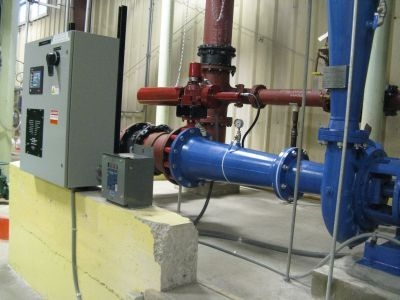
(Host) Almost every Vermont town once had industries powered by dams on brooks and rivers.
Now interest in hydro is back. Vermonters are lining up to redevelop old dams or produce power through new methods that don’t require dams.
But despite new government incentives to develop green energy, these small hydro projects aren’t getting built.
VPR’s Susan Keese has the story.
(Keese) Bennington’s drinking water comes from a mountain in nearby Woodford. Gravity carries it into the town’s water filtration plant, where it’s purified in a room full of big green pipes.
Now some of that water’s getting diverted through a turbine to generate electricity. The turbine supplies about half the water plant’s power needs.
(Turbine)
(Keese) The town-backed project, launched last month, is the state’s first *conduit hydroelectric project.
Bennington Community Development Director Scott Murphy says he thought the permit process would be easy, since the operation is contained entirely within the water treatment building.
(Murphy) "We run this parallel system by dropping this turbine inside one of our pipes, — we take the water that hasn’t been cleaned yet, throw it through the turbine generating electricity and then it’s put back into the cleaning mechanism that cleans the water for the town."
(Keese) But Murphy says the operation took a couple of years to launch, which made it more expensive than originally planned.
Geologist Lori Barg of Community Hydro in Plainfield was Bennington’s consultant for the project.
She says it’s the first new Vermont hydro operation to win approval from the Agency of Natural Resources in more than 20 years.
(Barg) "So, yes, it’s terrific and what was unfortunate was that we had to jump through as many hoops as we had to jump through for what is basically a plumbing project."
(Keese) Barg is one of many renewable power advocates calling for a streamlined certification process from the state — with automatic approvals for some small projects that don’t involve new dams or changes in water flow.
Hydroelectric activities are licensed, or exempted, by the Federal Energy Regulatory Commission. But the federal requirements include a state water quality certificate, assuring that hydro operations meet Vermont water quality standards.
The process can involve studies of fish habitat, water chemistry, flow, recreational impact, even aesthetics.
Catherine Gjessing is a lawyer for the state Department of Environmental Conservation. She says it’s difficult to create a predictable, cookie cutter process for small hydro operations because every stretch of waterway, and every project, is unique.
(Gjessing) "Not every site lends itself to the same analysis and not every project triggers the same kinds of environmental concerns under the water quality standards."
(Keese) But consultant Lori Barg says permitting can take so long and cost so much, many would-be hydro developers just give up.
Bennington State Representative Joe Krawcyzk, says his town looked into restoring a dam on an old paper mill six or seven years ago.
(Krawczyk) "The Agency of Natural Resources came down, they took us through the permitting process and we were convinced… it would take us ten years to get all the permits to put it back into production."
(Keese) Krawczyk says the town decided to focus on the water plant project instead.
Now Krawczyk says a new owner wants to generate power at the paper plant. He says other projects are also in the wings.
He’s introduced a bill he hopes will help them move forward.
(Krawczyk) "What we’re asking the agency to do is come up with a general permit program rather than all these specific little hoops they’ve got to jump through. Give that developer one general permit so he can go get his money to invest in this project, he can apply for any grants that might be out there."
(Keese) A similar bill is moving through the Senate, introduced by Essex-Orleans Senator Vince Illuzzi. That makes this the fourth year in a row the Legislature has tackled this issue.
For VPR News, I’m Susan Keese.